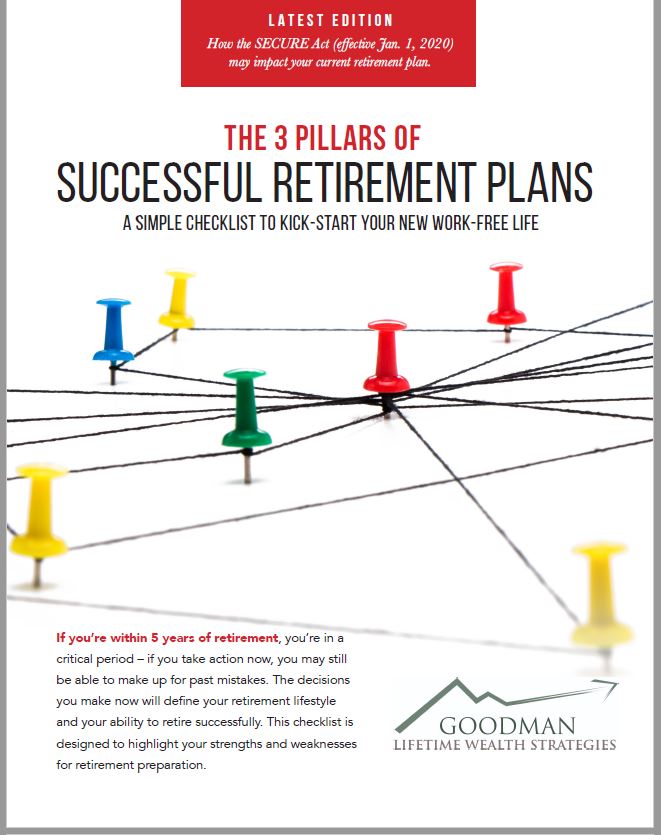Keep in mind, the most common answer is “it depends”. We will try to educate you as to what it commonly depends on.
Do I have enough?
Since life is full of uncertainty, no individual or projections can answer this in a one-time definitive manner.
What I suggest is to have an understanding of how your assets today project out into the future and understand the important variables to monitor and that may require future adjustments to how your $’s are invested and/or your spending choices.
Important factors you can control:
The financial strategies you use and their associated risk/reward, how predictable or not they are.
How much you spend each year on discretionary expenses, ie…travel, hobbies, new toys etc..
Important factors you have less control of but that could impact the answer to the question “Do I have enough”
Your actual health care costs in retirement, on average statistics report approximately 2 out of 3 65 year olds will at some time in their life need long term care services, are you in the minority or majority? If you are in the majority, will your own assets be paying these costs, or do you have protections in place to cover the costs?
I would suggest a general starting point is to look at your desired annual retirement income, determine your annual income sources ie..pension, social security or lifetime annuity income, then add in other investment income like real estate investment income.
The amount of that gap, multiply it by 25. For example if your annual income gap is $40,000, you would need $1,000,000 in retirement savings/investments to meet these “Do I have enough” guidelines”. The 25 multiple is what I see as reasonable for a healthy 65 year old, this equates to a 4% withdrawal rate, which is a common financial services industry approach to this question.
Someone younger than 65 would require a larger multiple and older a lower multiple. Subtracting or adding 1 per year below/above is in my opinion a reasonable approach, ie. A 60 year old would need 30 times the annual income need and a 70 year old 20 times.
How predictable or not are the financial strategies you are using? If unpredictable it makes sense to have a higher multiple.
How long will it last?
In our above example of the 65 year old with $1,000,000 and a $40,000 annual withdrawal rate, the starting estimate of how long it will last is 25 years.
Other factors to consider are what inflation rate to use in the projections as well as that your annual retirement spending may be variable.
For example many people plan to be more active, go on bucket list trips during their first 10 years or so of retirement, then they start slowing down in those areas and find they are spending less, so if that applies to you, your plan may involve higher annual income initially, and lower income in later years.
Which accounts should I withdraw from first?
This will vary based on one’s individual tax/income picture.
I have found once ones working income declines/stops, between the ages of 59 ½ and 73 generally provide the best opportunity to improve one’s retirement income and taxation plan, especially so if one hasn’t started social security retirement benefits.
Generally Roth IRA accounts are the last account to plan on regular withdrawals from, but one time income needs throughout retirement when one doesn’t want the income to be taxable can make sense to use a Roth IRA withdrawal to meet that need.
Generally it is a blend of withdrawing from a tax deferred retirement account like a 401k, IRA, 403B, or 457 and after tax savings/brokerage account where withdrawals often create less taxable income.
I suggest also thinking about your withdrawal plan as pre and post social security as well as pre and post required minimum distributions.
When should I start my Social Security retirement benefits?
I see 3 main financial planning considerations and then 1 important life planning consideration.
Let’s start with the financial planning considerations.
- The amount of the retirement currently increases by 8% each year after your full retirement age up to age 70. Social security retirement benefits can also be started as early as age 62, but you give up about 8% a year for each year prior to full retirement age the benefits are started, which for many was age 66, once we reach 2027, full retirement age will mean age 67 for everyone.
- Taxation of social security benefits. Some people pay 0 tax on their social security retirement benefits, the provisional income calculation determines how much if any of your social security benefits are taxed. The maximum is 85%, which is still less than pension income or a withdrawal from a taxable retirement account, both taxed at 100%, so social security income is more valuable than other taxable income, since not all of it is taxable.
- For married individuals, the surviving spouses social security benefit is whichever social security benefit is greater, so in many cases for married couples it is attractive for at least 1 spouse to defer and let the retirement benefit grow, at least until full retirement age, in many cases until age 70.
- The non-financial consideration is does the individual need to start social security early to live their ideal lifestyle. Do they want to retire early/now and need that income to make that work? If so, it is for each person to decide, what is more important to them, and understandable if they forego future higher lifetime social security income for an additional income stream starting right then.
What investments are best for me?
I could go on and on about this subject, but I think it starts with 2 primary considerations and a general awareness.
- What is your risk tolerance, your comfort with downward fluctuations in financial markets, how do you react when your investment account balances decline? Will you still feel that way after you transition from the working/contributing years to the retirement/distribution years?
- What is your risk capacity? Are you relying on your portfolio today for income? If not, how many years until you are? If so, can you sustain investment losses without the need to cut down on your lifestyle/spending?
The general awareness area is if you are working with a financial professional, understanding what sort of limitations if any as far as the financial strategies they can provide you, as well as understanding planning to retirement is different that planning through retirement which often means the investment strategies used in the accumulation years are often not the right ones to use during the distribution years.
Learn about annuities, have a clear understanding of why a certain type of annuity may or may not be appropriate for you.
If you don’t have a desire for one or both of the following, most likely an annuity will not be right for you, a guarantee* of future lifetime income or a desire for principal protection with better growth potential than what bank products provide.
*Guarantees are backed by the financial strength and claim paying ability of the issuing insurance company.
Am I maximizing my tax savings opportunities?
During the working years it often is as simple as making the maximum annual tax deductible contribution and maximizing any employer match incentives.
Additionally during the working years which is often the highest tax paying years, if one can add tax deferral on their non IRA/401k $’s that can be attractive.
During retirement, most people in my experience aren’t maximizing there tax saving opportunities . There is confusion around how the various common retirement income sources inter-relate and how to advantageously reduce future tax liability each year on relatively attractive terms.
Hopefully the ideas I shared with you help you on your path to optimizing your financial future!
Adam Goodman is an Independent Financial Advisor and the founder of Lifetime Wealth Strategies, www.LTWealthStrategies.com a comprehensive retirement planning firm in Las Nevada, and has been working in the Financial Services industry since 2010.
In addition to investment and insurance licenses Adam currently holds 4 financial services industry designations, the WMCP® program provides a comprehensive curriculum in investment management centered on client goals. RICP® is a designation awarded to financial advisors who complete a series of training around a variety of retirement topics related to Retirement Income Planning and other issues that are often unique to the retirement phase of life. The Tax Planning Certified Professional® (TPCP®) is a specialized designation that provides financial professionals with comprehensive tax planning training. The LACP® is a certification exemplifying excellence with Life Insurance & Annuities in the areas of:
- Product Knowledge
- Consultative Sales Process
- Ethical, Legal and Regulatory Requirements
For Individuals over age 59 ½, within 2 years of retirement, or self-employed individuals saving $30,000 or more annually for their retirement, Adam currently offers a 1 hour complimentary retirement planning strategy session, where we focus on understanding your goals, financial opportunities and what if any improvements you can make! Adam can be reached at info@ltwealthstrategies.com or 702-462-7233
Investment Advisory Services are offered through Brookstone Capital Management, LLC (BCM), a Registered Investment Advisor. Insurance and annuity products are provided separately through Adam Goodman


